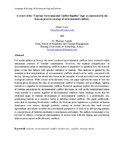A review of the “Tourism- Environmental Conflict Signifier” logic as constructed by the Kenyan press in coverage of environmental conflicts.
Abstract
most vocalized environmental conflicts have occurred within
situational contexts of tourism communities. However, the marked insignificance of
environmental issues in determining conflicts makes it imperative to question how the Kenyan
press covers this subject with specific reference to tourism. This analysis is guided by the
assumption that interpretations of environmental conflicts should not be solely concerned with
the key driving factors, but should also factor in the interplay of local and extra-local, social and
ecological contexts. With a focus on biodiversity rows, our paper explores the issue of how the
Kenyan press decenters the idea of environmental conflict to tourism, and accordingly equates
tourism to a signifier of environmental conflicts. Research questions explore the (in)consistency
of tourism associations to environmental conflict discourse, as well as the unarticulated issues
when tourism is a master signifier of environmental conflicts. Study findings reveal that the
relational angle of tourism development to environmental conflicts is a problematic one,
positioning tourism as a causative factor in defining related conflicts. The paper additionally
notes that in reporting biodiversity conflict, the Kenyan press legitimizes a position of human
dominance over nature, through symbolic content in textual devices that tend toward
egocentrism and render invisible the extra-human perspective. It does so in self-serving patterns
to conceal traces of fatalities and harm to non-humans and nature. The authors recommend a way
forward to achieve a balanced representation of stories from both the human and non-human
sides in press reports on biodiversity conflicts.
Keywords: tourism, environmental conflict, biodiversity, signifier,

